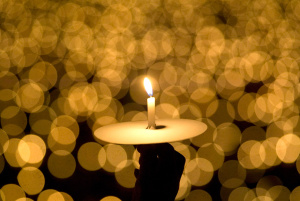The Melancholy Ones
Each year, I grow a little bit more convinced that I’m not alone—that there are others, many others, I think, who prefer the melancholy Christmas songs over the rambunctiously joyful ones. My completely non-scientific research has led me to this conclusion. For what other reason would there be eleven different renditions of “O Come, O Come Emmanuel” in my Christmas playlist? Or nine versions of “I’ll Be Home for Christmas”?

There’s something in this, I think. Something more than just the beauty of the minor key or the nostalgic lyrics. For some reason, our hearts are drawn toward sorrow in this season of joy.
I wrote a blog post a year ago that I shared again at the beginning of December this year. It is the most-read blog post on my site—by a lot. And I think one reason is that it’s about the hard task of being joyful at Christmas when so many of our lives are swamped in sorrow, so much of the world bearing pain. And guess what? It has a melancholy song in it.
There’s something about the melancholy ones.
Perhaps it is that First Christmas (more another time on how I’m defining that this season) is, in one way, an inherently sad event. God left all the wonders of glory to live in dirt. He sent His son—to live as a human, yes—but knowing He would have to die. It is, as Selah puts it, a mystery: that God chose to create man knowing that man would rebel; and not only that, God sent His son to save the traitors.
So we wonder as we wander in the bleak midwinter and we live in this tension of celebration. As we ache in the agony of waiting for God With Us, we still rejoice. We push our troubles far away by hanging a star upon the highest bough. We listen to the bells on Christmas day, looking about at hate of man against man, and hear them tell us that God is not dead—nor does He sleep.
My favorites of the melancholy ones are those that seek out the joy in the midst of the darkness. Most of them do. Because that’s another thing about First Christmas: it is all about light entering darkness—and the inability of darkness to overcome it.

